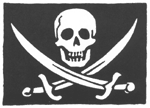The Loss of the Royal George
By E. Weston Farmer
The storm had cleared the night
before, and the day dawned with the bully song of life. The
heaving green seas and the cloud-scudding sky freshened the
pulse of all living things. Tense, suspended by a thread, adventure
hung in
the air.
Only yesterday noon, while putting
in for water at Mrs. Clancy's little Inn above the beach the
Royal George had been hauled by a Pirate, and her men murdered.
This sun-up on the beach, the
dying surf cast the wreckage of Her Majesty's ship, brig, thirty-two
guns, far up the sands—tossed the splintered wreckage,
all little pieces of wood; mute testimony to the fury of the
storm that had driven the Pirate off, as he scuttled the George
and surprised and butchered her leaden crew.
Here, tumbled in the dross,
was her once proud and high-steeved spirit. There in the undertow,
her main stuns'l, riddled by cannon and shot from the stays,
caught the heave of the swells and lapped liquidly over the
reef at the end of the beach. High on the drying strand lay
a portion of the man-o-war's poop, its royal red, its white,
its stoned oak all still valiant. Everywhere was desolation.
A sense of uncompleted tragedy hung about the scene.
 Doubt
not that at this juncture there should round the promontory
with stealthy stroke, a vessel bearing—yes! the pirate
chief! Why he should come atone is not for us to answer here,
nor yet to speculate. But clad in approved piratical knee pants,
with sturdy legs he stepped from his bumboat as it grated the
sand. A burly fellow, and youthful enough, with all approved
cutlasses and armament as per the 1610 Pirate's and Badmen's
Union rules. He looked not as vicious as one would have expected
in recalling the slaughter aboard the ship, but as he spat viciously
on the sand and a sneer bared his teeth, revealing two uppers,
front, missing, any soul with the fear of God in his system
would have shuddered at the obviously wicked, cruel deep-dyed
seafaring criminal he was. A bad fellow, bent this morning on
solitary, evil and secret business. Else why should he haunt
the scene of the wreck alone?
Doubt
not that at this juncture there should round the promontory
with stealthy stroke, a vessel bearing—yes! the pirate
chief! Why he should come atone is not for us to answer here,
nor yet to speculate. But clad in approved piratical knee pants,
with sturdy legs he stepped from his bumboat as it grated the
sand. A burly fellow, and youthful enough, with all approved
cutlasses and armament as per the 1610 Pirate's and Badmen's
Union rules. He looked not as vicious as one would have expected
in recalling the slaughter aboard the ship, but as he spat viciously
on the sand and a sneer bared his teeth, revealing two uppers,
front, missing, any soul with the fear of God in his system
would have shuddered at the obviously wicked, cruel deep-dyed
seafaring criminal he was. A bad fellow, bent this morning on
solitary, evil and secret business. Else why should he haunt
the scene of the wreck alone?
Not a soul had washed ashore
from Her Majesty's ship—no man to tell the tale, smashed,
splintered, wrecked, utterly done for her hull was, too. Yesterday
she had been scuttled for the sheer fun of it. No more, no less.
Now appeared upon the scene the pirate chief, alone and cursing.
"I imagine," said the
chief, with a villainous chuckle, "Her Majesty will raise
hell when she hears of this. Not a man living. Ha, Ha! Much
as it displeases me, Elizabeth must hear of this from me in
person, and at once. Oh, for a skilled ambassador!" His
brow knitted falteringly, did the pirate's, and he stepped hesitatingly
toward the queer-hulled boats, standard with that type of pirate
in those days. according to rules of the Union. But no! Not
yet! He spied the cabin of the Widow Clancy, hostess
of the Inn. Well he knew the widow—oft had he been humiliated
by her rebukes. Her little patch of seaside farm had sheltered
many in distress and at times the widow, young, fiery and pretty,
would drop her maternal reserve and revel in proper merriment,
much to the liking of the chief. Often in the twi—well,
when pirates have designs on young wid—well, it's time
to quit writing that's all.
A flush came over his countenance.
Yes, he must see the widow. Determined, designing, up the beach
hiked he. Once, stopping, he viewed the wreckage below and bethought
himself of the sad duty he had of telling of the plundering
to his friendly enemy the Queen. What a shock it would prove
to her uncertain nervous system! Then on and up, with flushed
face.
He paused near the door, for
he perceived the widow framed there, her bosom heaving with
emotion. The sky and sea freshened the pulse. Tense, suspended
by a thread, the sword of fate hung in the air. Oh, pity the
little widow!
"Willie Clancy, you run
to the woodshed and remove your trousers. I'll teach you to
play with my mantelpiece model!"
Be it said for the pirate that
he scuttled around the corner and into the woodshed so quickly
he scooped sand in his hip-pocket, which you will claim is leaning
some, even for a pirate. Nay, nay. Elizabeth Clancy was Her
Majesty: the pirate her son of ten.

